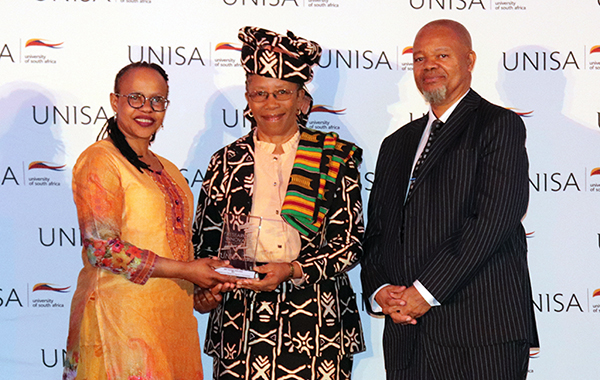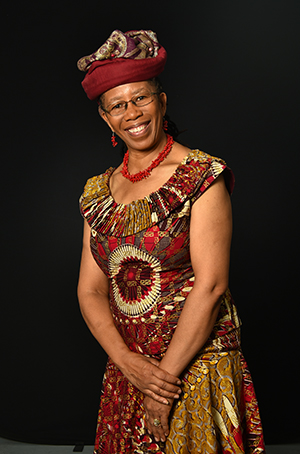
The African college of excellence in the social and human sciences
Delighted to collect a National Research Foundation (NRF) B3 rating at this month’s 2020 Research & Innovation Awards, Prof Madipoane Masenya, from the Department of Biblical and Ancient Studies in the College of Human Sciences says, "It’s a historic milestone in my scholarly life to be recognised for such an honour as it has a huge impact on scholarship both locally and internationally."

Prof Thenjiwe Meyiwa (Vice-Principal: Research, Postgraduate Studies, Innovation and Commercialisation) and Prof Mandla Makhanya (Principal and Vice-Chancellor) congratulate Prof Madipoane Masenya (CHS) (centre) on her 2020 NRF B Rating.
She firmly believes that being an academic at various higher education institutions played a critical role in her achievement. From 1991 to 1995, Masenya was at the erstwhile University of the North, now the University of Limpopo, and then became a Unisan in 1996. She notes that the support included the provision of library facilities and funding to attend academic conferences. "It made a difference to my publication record and exposed me to my peers from local, continental to international level."
 Although her research journey began in 1989 after completing a Master of Arts (MA) degree with Unisa, Masenya remains focused on African women’s biblical hermeneutics. In her PhD thesis she explored Proverbs 31:10-31 in a South African context: A bosadi (womanhood) perspective. She contextualised the book of Proverbs in a Northern Sotho setting using a bosadi approach to engage the text. "I came to know that there is no value-free interpretation of the Bible," she says.
Although her research journey began in 1989 after completing a Master of Arts (MA) degree with Unisa, Masenya remains focused on African women’s biblical hermeneutics. In her PhD thesis she explored Proverbs 31:10-31 in a South African context: A bosadi (womanhood) perspective. She contextualised the book of Proverbs in a Northern Sotho setting using a bosadi approach to engage the text. "I came to know that there is no value-free interpretation of the Bible," she says.
"Employing the bosadi approach enabled me to read the Bible, which is popular and important as a spiritual and cultural resource, especially among many African-South African Christian women, in ways that challenge patriarchy both in the biblical text and in African contexts."
Considering that some of her doctoral students apply the bosadi concept to their different contexts, she affirms, "It’s a pointer to the impact of my scholarship in various African women’s contexts."
As a trailblazer in her field, Masenya is not only the first South African woman to get a doctoral degree in Biblical Studies, but also the first scholar to approach the Old Testament (OT) from a womanhood perspective at Unisa.
She elaborates: "As a matter of fact, I discovered last year when giving a lecture at the University of Botswana that I was in fact the first black female to obtain a degree in Old Testament studies in Sub-Saharan Africa!"
BOSADI - coining a word from the African context that speaks to the unique context of African-South African women
Sharing some highlights about the connections and networks she encountered along the journey. Masenya explains that the non-existence of feminist and womanist biblical scholars previously gave her an opportunity to go to the Garrett-Evangelical Theological Seminary in Evanston, IL, USA. She conducted parts of her doctoral research under the guidance of an OT feminist scholar, Dr Phyllis Bird, for three months. "I then attended classes of well-known feminist theologians Dr Rosemary Radford Ruether and Dr Ruth Duck."
Similarly, Masenya was exposed to many works by feminist and womanist scholars. More importantly, she had an opportunity to meet the renowned womanist Hebrew Bible scholar, Dr Renita Weems. "She is the one who encouraged me to coin a word from the African context speaking to the kind of women’s liberationist framework that would make sense to the unique context of African-South African women."
"I am grateful for the numerous feminist and womanist biblical scholars who researched various areas pertaining to the biblical text, especially the Hebrew Bible. Through their works, I was able to basically self-mentor and figure how the knowledge gained could be applied to my own context," Masenya says.
Winning this prestigious award propels Masenya to appreciate her family for the support provided through all the years. Starting with her husband, she says: "Dr Malesela Masenya is a God-given jewel. In our patriarchal African contexts, very few men of his calibre can release their wives to do a visiting scholarship programme in a foreign country for more than a year!"
She also thanks her children, who had to miss her motherly warmth even at their tender age when she would be on research travels. "However, even more importantly, I am thankful to God, for all the gifts bestowed on me such as life, good health and an opportunity to work and do research, as well as for the accolade which I am celebrating today."
* By Lesego Ravhudzulo, Journalist, Department of Institutional Advancement
Publish date: 2020-03-24 00:00:00.0